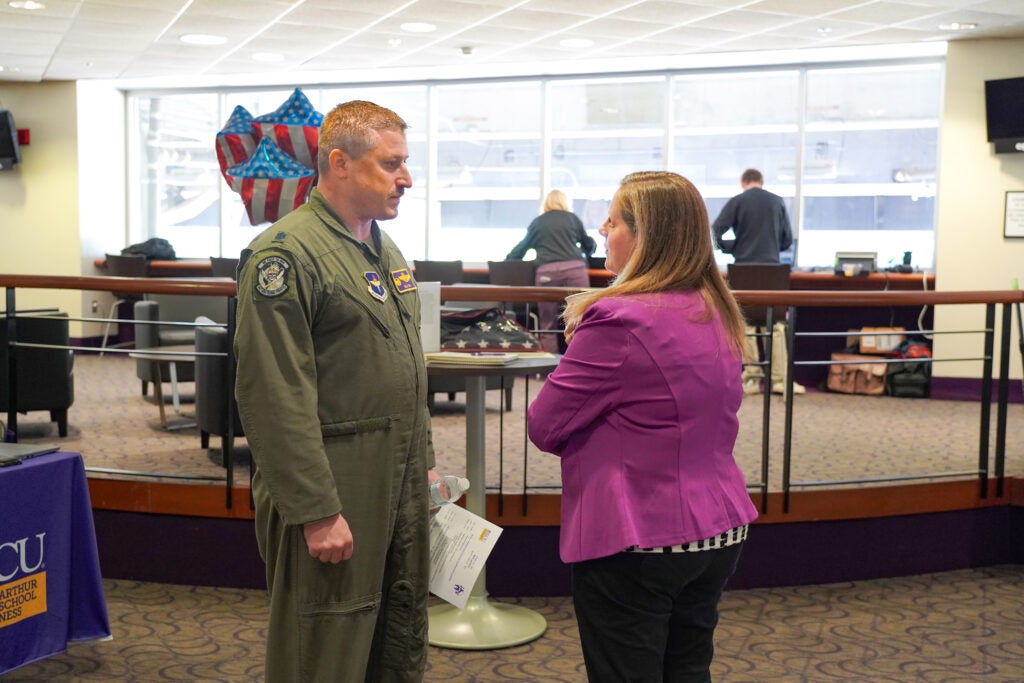March 30, 2025
Nonprofits, universities build connections to support vets

As part of a weekend of collaboration and support for veterans, particularly those transitioning from the military into civilian life, East Carolina University’s Thomas D. Arthur Graduate School of Business and the nonprofit Whole Vet hosted two events March 21 at Dowdy-Ficklen Stadium.
“We’re here today for one reason, and that is to collaborate,” said Dale Robbins, president and founder of Whole Vet and an ECU alumnus.
The day started with the Military Veteran Enablement Coalition, which Robbins described as a collaborative event designed to enable and encourage nonprofits to work together. Along with the nonprofits, several universities provided information about educational opportunities and their veteran support programs.
“It’s really building relationships so we’re force multipliers for each other as we go back to our communities and serve the military and veteran community,” Robbins said.
In addition to resource tables and networking opportunities, the morning included a panel discussion with representatives from veteran service organizations Irreverent Warriors, Paws of War Eastern NC, Veteran Services of the Carolinas, and the Honor Foundation. In both the morning and afternoon sessions, Kimberly Ramsey of TransWorld spoke about helping veterans become entrepreneurs by purchasing existing businesses, and Bill Cox presented his plans for a 9/11 Traveling Remembrance Flag.
The flag, which flew outside the stadium during the event, will be flown nine days each month for 11 months, Cox explained. “We will then fold it and put it in a shadow box. We will transport it to New York City via all the crash sites — Shanksville, the Pentagon and then the towers memorial. That flag will then be given to a police, fire or port authority department in New York City.”
Cox plans to repeat the operation each year, donating each flag to a different department affected by the attack.
The afternoon session, called Military Career Transition Day, featured a professional development discussion and was designed to provide information and networking opportunities to veterans and their spouses.
Following the stadium events, veterans and their families were invited to attend the ECU baseball game against Memphis, and on Saturday, March 22, Irreverent Warriors held a Silkies Hike focused on preventing veteran suicide by fostering camaraderie and connection. The veterans-only hike offered participants a chance to bond, support one another and build lasting relationships.
The weekend of events “gave us all much better insight into the challenges the military community faces, especially in the transition into the civilian sector,” said Len Rhodes, executive director of the Arthur School. “It’s been fantastic to have Dale, an ECU alum, back on campus to host this, and it’s been a good day to bring together the partners … to continue to grow our relationship with our military partners and other partners that are serving their veteran community.”
Marine Corps veteran Ruben Rodriguez said he joined right out of high school, so he had never had to navigate the civilian job market before.
“Learning from industry experts and networking with others who have successfully transitioned will be incredibly valuable as I plan my next chapter,” he said. “Having an event like this, designed specifically to support and empower veterans, provides a sense of reassurance and community. It’s encouraging to know that ECU is invested in helping service members transition successfully into the next phase of their careers.”
Johnathan Severs, director of client programs for Hire Heroes USA, said the unique challenges of transitioning to civilian life include translating military skills into civilian job qualifications, adjusting to a new work culture, and finding employment that provides stability and growth. The organization provides career coaching, resume writing assistance, interview preparation and job search guidance for veterans, transitioning service members and military spouses.
“Many veterans also face barriers like underemployment, lack of professional networks, and the need for additional training or certifications,” Severs said. “Having someone in your corner who understands the transition process and the resources available can make all the difference in overcoming these challenges.”
An estimated 18-20,000 service members transition to civilian life each year in North Carolina alone, Robbins said, so there is plenty of need and demand for veteran services. For an event like this, he said, “if we make a difference in one life, it’s a success.”
COB Dean Mike Harris said the combined efforts of the participating organizations and the veterans they serve are beneficial not only to each other, but to all of eastern North Carolina.
“One thing I have learned in 25 years in serving this region is that it takes a team,” he said. “It takes everyone’s help to make the magic happen.”
- Categories:
- Uncategorized
